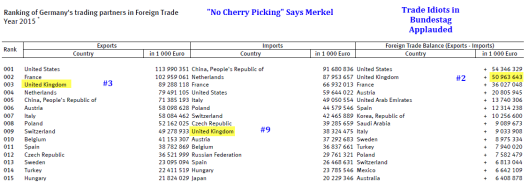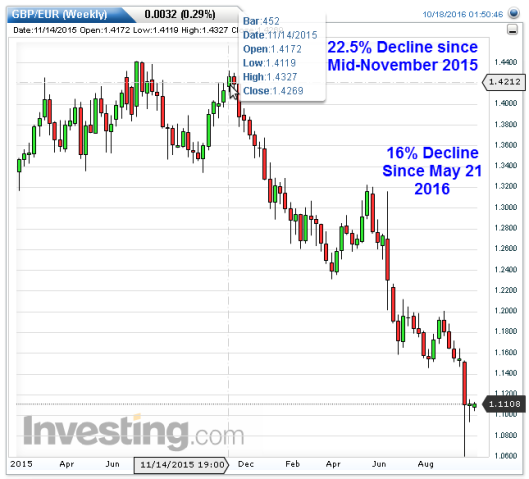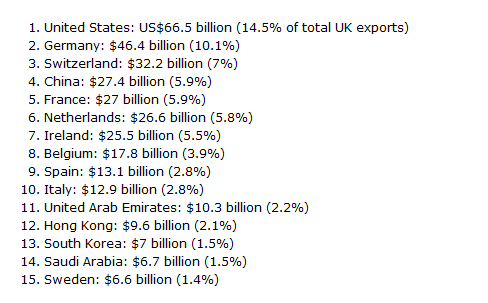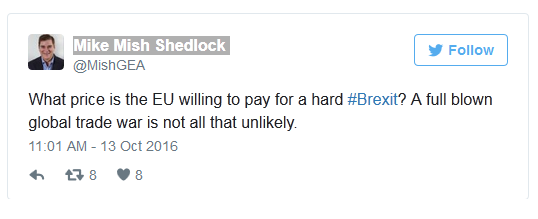UK prime minister Theresa May hopes the EU will come to its senses and negotiate a fair Brexit settlement.
Unfortunately, current rhetoric suggests a “hard brexit” is the most likely scenario.
If so, who are the winners and losers?
In aggregate, no one wins trade wars. In isolation, there are winners and losers.
The average UK citizen is a loser thanks to higher inflation and the falling British pound. Retailers dependent on goods from the EU will get hit hard.
Common wisdom says UK exporters will get crushed because of EU tariffs, but that alleged wisdom is likely wrong.
For certain, EU exporters to the UK will get hit the hardest as noted by Germany’s Trade Position with the UK.
Germany’s Trade Balance with UK

Bluff or Stupidity?
Germany exports €50,963,643 to the UK than it takes back in imports.
Clearly, Germany would suffer far more damages than the UK were both sides to remain stubborn.
UK prime minister Theresa May has another bargaining chip: corporate taxes. This especially comes into play given that Manual Valls, the French Prime Minister wants EU-wide tax rates, much higher than corporate tax rates in the UK.
EU Tariffs on UK Goods and Vice Versa
In the case of a hard Brexit, conventional wisdom says the EU would be obliged to place tariffs on UK goods.
I believe both entities could look the other way in negotiations, but let’s assume conventional wisdom is indeed correct.
Under this scenario, let’s further assume 15% tariffs by the EU and the UK on each other.
That may sound like a tit-for-tat deal but it is actually much worse on the EU, over and above the above trade figures, because of currency fluctuations.

The British Pound is down about 22.5% vs. the Euro since the mid-November 2015 high.
The Pound is down about 16% vs. the Euro since May of 2016.
A 15% tariff by the UK on German cars would effectively mean the price of German cars to UK buyers would rise by a whopping 30% since May, but the price of British goods in the EU would be roughly unchanged.
A hard Brexit would mean the UK would no longer contribute to the EU budget. And a hard Brexit would also mean the the EU would not see the “€20 Billion Divorce Settlement” that it seeks.
Free from the nonsense of having to get 27 nations all to agree in trade talks, the UK can negotiate new trade deals much faster than it can now.
Let’s now look at UK Trade Relationships with the EU and rest of the world.
UK Trade Relationships

The above list shows the United Kingdom’s top import partners, countries that imported the most UK shipments by dollar value during 2015. Also shown is each import country’s percentage of total UK exports.
Thanks to the depreciating Pound, it’s not at all certain that the UK would lose exports to the EU. Moreover, the UK will have an easier time exporting to the US and Asia, assuming a fast trade negotiation.
Other UK Losses
The UK will lose some financial services activity, and that may even start quickly if the talks are as acrimonious as they currently sound.
Summation
I will not put any Dollar or Pound values on this as many things can and likely will change such as tariff rates and currency fluctuations. The global economy is also entering a slowdown so trade is likely to sink no matter what.
But as it stands, and contrary to all the Remain fearmongering and punishment talk, it’s the EU, not the UK that will get clobbered the most if there is a hard Brexit.
Advice

Salt and vinegar for everyone is a foolish idea.
My advice for the EU, not that I think they will take it, is to go over this framework of winners and losers and not attempt to punish the UK, because such a move is guaranteed to backfire.
